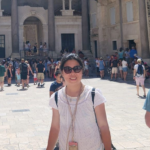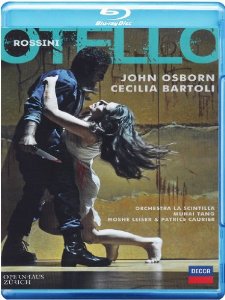Before there was Verdi’s Otello, Rossini’s Otello was considered the master operatic adaptation of Shakespeare’s tragedy. It’s easy to see why Rossini’s Otello was acclaimed at its time, and also why Verdi’s Otello eventually eclipsed the Rossini version. The main deficiency in Rossini’s version is that the libretto is so much weaker than Boito’s libretto for Verdi’s opera. Boito masterfully condensed Shakespeare’s play into an inexorable, terrifying tragedy. Rossini’s libretto (by Francesco Maria Berio di Salsa) excises a lot of Shakespeare’s dramatic devices and then adds unnecessary filler.
In the Shakespeare play Desdemona’s father disapproves of his daughter’s marriage. In the opera, Desdemona’s father (named Elmiro for unknown reasons) is almost the main catalyst of the action. Iago is reduced to a sniveling background schemer. Otello and Desdemona are never married in this version, they are merely secretly “promised” to one another.
Elmiro gives his daughter’s hand to Rodrigo, and Iago convinces Otello that a letter Desdemona wrote to Otello was instead intended for Rodrigo. Desdemona’s handkerchief and Cassio (major plot points in Shakespeare) are nixed. Otello stabs Desdemona to death in a jealous rage (instead of smothering her) and when he’s discovered he stabs himself to death. Curtain.
All of these changes weaken the dramatic plausibility of the plot. Otello and Desdemona are never given a tender moment together to show the audience that their love is genuine. Otello’s not a sympathetic character at all—he’s jealous and paranoid from the start, and there’s not that complexity that makes him a tragic hero in both the Shakespeare and Verdi versions.
Iago’s jealousy about both Cassio and Otello are erased, and his malignity becomes even more motiveless. Lost somewhere in the libretto is a line that says that Iago harbors feelings for Desdemona, but it’s still a weak-sauce, neutered version of one of literature’s most terrifying villains. Emilia in Rossini’s opera is simply Desdemona’s maid. There’s no mention of her being Iago’s wife. Another major dramatic arc is thus diminished. I could go on.
Rossini’s version has never completely fallen off the repertory map though—there is a fine recordins with Jose Carreras/Frederica von Stade and, on the Opera Rara label, another
with Bruce Ford and Elizabeth Futral. This video taped from the Zurich Opera should further satisfy those who consider Rossini’s Otello one of his finest creations.
Rossini’s music is some of the greatest he ever wrote. This is one of his “three tenors” operas and he masterfully characterizes each major tenor—he gives Otello declamatory, heroic music, Rodrigo a more lyrical style, and Iago an extremely high-lying, almost whiny vocal line that loops back to the baroque castrati villains. Desdemona’s famous Act three scena has always been popular with Rossini mezzos and sopranos in concerts. The act three duet between Otello and Desdemona is as frightening in its intensity as Verdi’s version.
This video is exhibit A of how we really are living in a Golden Age for Rossini singing. All three tenors are excellent. John Osborn (Otello) has a darker, more heroic timbre but he can negotiate Rossini’s tricky vocal lines without any problems. If anyone can sing William Tell, it’s him.
Rodrigo (Javier Camarena) shows all the attributes that made him a sensation in New York this season—the sweet timbre, the secure, ringing upper register, and the ingratiating stage presence that makes Rodrigo a genuine romantic rival and not just an annoying gadfly.
Iago is the weakest of the three tenor roles. He’s given no solos, only duets, and his presence in the plot is mainly to stoke Otello’s already burgeoning jealousy. But Edgardo Rocha makes the most of the part, stealing scenes with mustache-twirling villainy. Only Peter Kalman (Elmiro) displays an occasional discomfort with the music and a somewhat worn voice.
Cecilia Bartoli, the de facto queen bee of Zurich, is a mixed bag as Desdemona. Bartoli has branched out to much more diverse repertoire, but she’s never abandoned Rossini, and Rossini hasn’t abandoned her either. Her voice remains almost ideal for Rossini’s operas—her timbre warm and dusky, her machine gun coloratura remarkable for its ability to squeeze about 60 billion notes into a 30 second timespan.
She has a freak upper extension that allows her to end ensembles with blazing soprano-like high notes. She ends the Act Two ensemble with a huge, long-held B. But this extremely long role also shows some of her irritating vocal mannerisms. For instance, in the recitatives, she often resorts to a breathy delivery as well as overly emphatic diction that sounds as if she’s both spitting out words like sunflower seeds and inhaling a helium balloon at the same time.
I call this an affectation because she is completely capable of singing a clean, unfussy vocal line, as she does during “Assisa a pie d’un salice” and “Deh calma, o ciel bel sonno.”
The production by Patrice Caurier and Moishe Leiser is extremely strong. Everyone is well-directed—there’s not a single moment where you think, “Well that didn’t work.” It’s a modern dress production that follows the libretto but has a distinctly feminist bent. Desdemona is at first seen as a powerful, confident woman. She’s wearing a rather severe black dress and black pumps. But she lives in a rigid, male-dominated world. Even Emilia (Liliana Nikiteanu) is a rather masculine and not particularly nurturing figure.
As the men dominate and control her, she defies them (in Act Two, she stands on top of a pool table and drinks beer to rebel against her father), but eventually she’s worn down. In Act Three she has a scar running down the back of her neck, indicating a suicide attempt, and the words “Nessun maggior dolore che ricordasi del tempo felice nella miseria” are written in blood in the back wall of Desdemona’s bedroom.
The final confrontation between Otello and Desdemona is hair-raising in its intensity. The duet becomes more and more heated, until it results in a passionate kiss. When Otello proceeds to stick the knife in her, the moment is shocking and appalling.
This production has already traveled to Salzburg and Paris and hopefully will travel to a few more cities, as it’s a well-directed, well-thought out production and it makes a good case for Rossini’s opera to return to the repertoire on a regular basis.Mihai Lang and the Orchestra La Scintilla are excellent. They never let the momentum lag in Rossini’s opera.
The video includes the curtain calls which are quite the Cecilia Bartoli Show. She comes out to her adoring crowd, and seems overwhelmed by the applause. You see her eyes glisten. She’s pelted with bouquets. The other members pick up the bouquets for her, and then she, Prima Donna Extraordinaire, slowly distributes the flowers among the cast. She lets petals fall to the ground. The stage is covered with petals and cast members holding a single flower, but Bartoli continues to distribute the flowers as the credits roll.
She is the Queen, and this is her kingdom.




